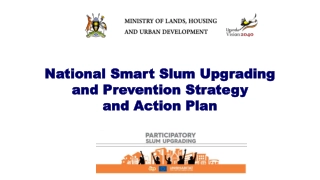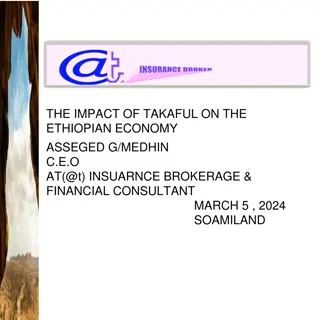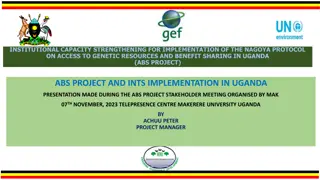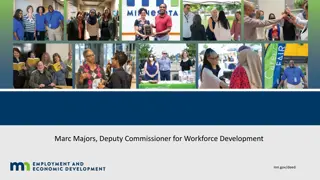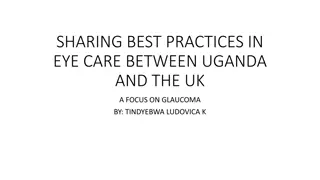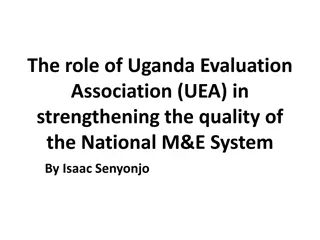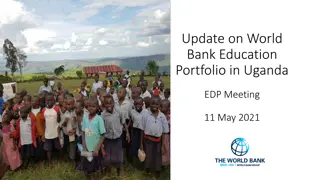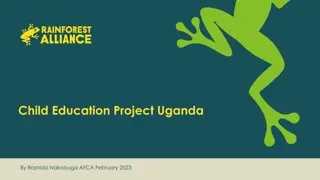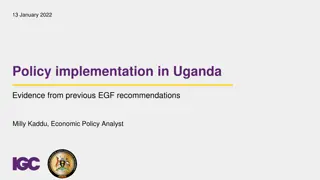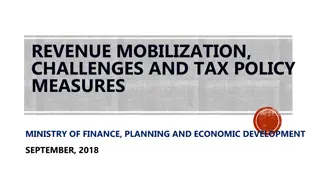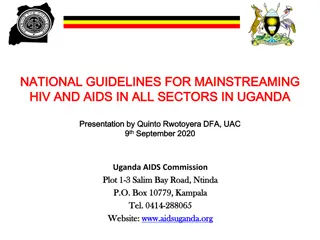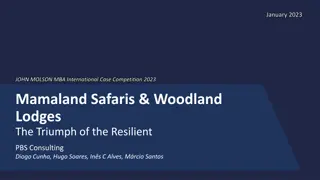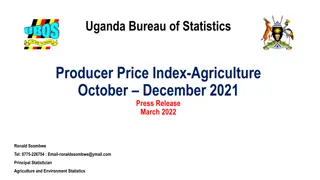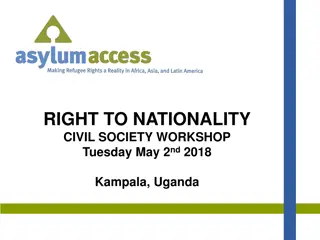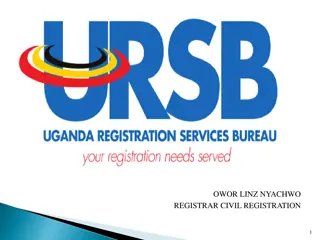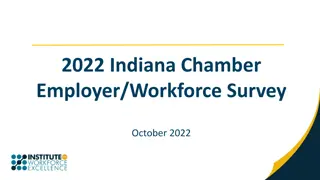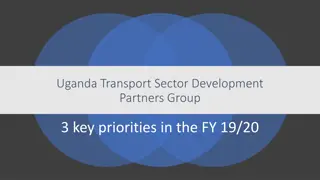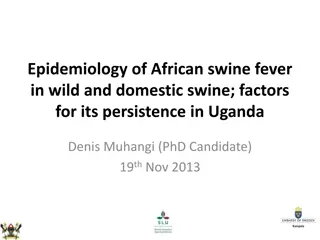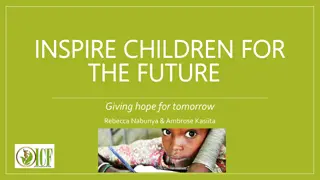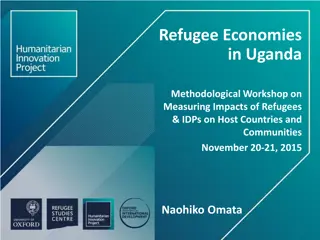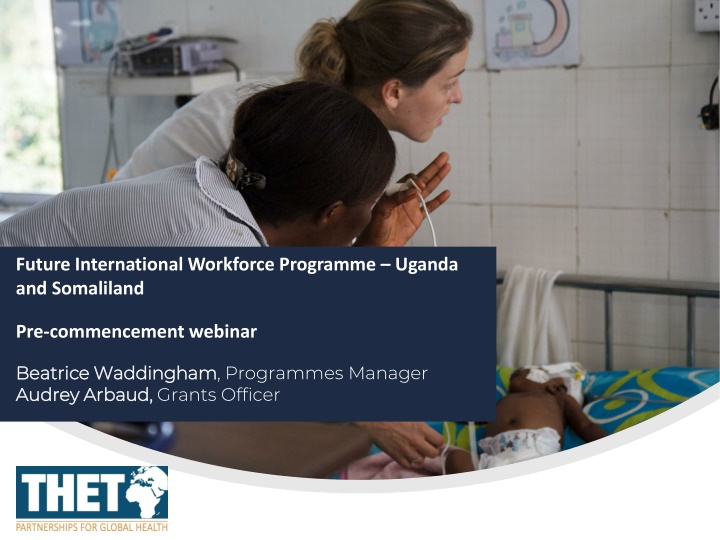
International Workforce Programme in Uganda and Somaliland
The Future International Workforce Programme in Uganda and Somaliland aims to address the shortage of quality healthcare workers, particularly nurses, through training, workforce management support, and enhancing healthcare worker quantity and quality, with a focus on accessibility for vulnerable populations. The program involves partnerships, project outlines, objectives, and outcomes in both countries.
Download Presentation

Please find below an Image/Link to download the presentation.
The content on the website is provided AS IS for your information and personal use only. It may not be sold, licensed, or shared on other websites without obtaining consent from the author. If you encounter any issues during the download, it is possible that the publisher has removed the file from their server.
You are allowed to download the files provided on this website for personal or commercial use, subject to the condition that they are used lawfully. All files are the property of their respective owners.
The content on the website is provided AS IS for your information and personal use only. It may not be sold, licensed, or shared on other websites without obtaining consent from the author.
E N D
Presentation Transcript
Future International Workforce Programme Uganda and Somaliland Pre-commencement webinar Beatrice Waddingham Beatrice Waddingham, Programmes Manager Audrey Arbaud, Audrey Arbaud, Grants Officer
Webinar Webinar outline outline 1. Programme aims, objectives and background 2. Projects in each country 3. Policies and toolkits 4. Reporting requirements 5. Monitoring and evaluation considerations 6. Communications 7. Contractual requirements 8. THET's role 9. Next steps 10. Q&A 11. Support from THET Somaliland Office
1 1.. Aims Aims and and outcomes outcomes of of FIWP FIWP U&S U&S Overall programme aim: Address the global shortage of quality health workers, especially nurses. Through: 1. Delivering training that leads to nurse qualifications to refugees/displaced people 2. Supporting governments to improve their health workforce management 3. Increasing the quantity and quality of healthcare workers, across cadres and health themes, leading to an increase in better trained health workers 4. Increasing access to vital services for the poorest and most vulnerable, including the refugee population, across all regions of Uganda and Somaliland.
1 1.. Aims Aims and and outcomes outcomes of of FIWP FIWP U&S U&S In Somaliland: Supporting 4 UK-Somaliland health partnerships to deliver health systems strengthening activities: 208 healthcare professionals 7 regions of Somaliland 21 health delivery institutions Working closely with the Somaliland Ministry of Health to: revise and develop nursing and midwifery curricula, ready to be implemented nationally by Somaliland nursing and midwifery faculty
1 1.. Aims Aims and and outcomes outcomes of of FIWP FIWP U&S U&S In Uganda: Supporting UK-Uganda health partnerships to deliver health systems strengthening activities 4 regions of Uganda 3,100 healthcare professionals 70 health delivery institutions New and improved curricula, policies and guidelines
2. Funded projects and partnerships in Somaliland Lead partners Additional partners Projects Ministry of Health Development (MoHD); World Health Organisation (WHO) UK Somaliland Partnership for Improving Quality Care King s Global Health Partnerships; Borama Regional Hospital The Royal College of Surgeons of England (RCSEng); Somaliland Medical Association (SLMA) Ministry of Health Development (MoHD); MedicineAfrica; Hargeis a Group Hospital; Burco Regional Hospital Partnership for Surgical Systems Strengthening (PaSSS) in Somaliland Coventry University in partnership with Nursing Now Challenge; Edna Adan University and Hospital Royal College of General Practitioners (RCGP); University of Warwick Ensuring healthier lives: Healthcare Partnerships co-designing Education and Leadership train the trainer programmes to strengthen sustainable maternity care provision in Somaliland (MATER-SOM) University of Wolverhampton; University of Burao (UoB) Initiatives for Regional and International Development (IRiD); Allies Foundation Strengthening primary care services for non-communicable diseases in Somaliland
2. Funded projects and partnerships in Uganda Lead partners Additional partners Projects London School of Hygiene and Tropical Medicine; Adara Development Uganda Born on the Edge; MRC/UVRI Uganda Research Unit Improving early identification and intervention for young children with developmental disability through community health systems strengthening in Uganda Manchester Metropolitan University; Butabika School of Psychiatric Nursing/Butabika National Mental Health Referral Hospital Makerere University Enhancing community for student mental health nurses: improving community mental health capabilities to meet Uganda's identified health challenges Nottingham Trent University; Makerere University School of Public Health A Health Systems Approach to Strengthening Community Health in Wakiso District, Uganda Sheffield Health and Social Care NHSFT; Gulu Regional Referral Hospital University of Sheffield; Gulu University Suicide awareness and prevention training of trainers programme in health centres in the Acholi sub-region of Northern Uganda
2. Funded projects and partnerships: THET projects Two THET projects, which our Country Office teams will be delivering with partners. In Somaliland: THET aims to develop new and revised curricula for nursing and midwifery adopted by the MoHD and ready for implementation by nursing and midwifery faculties In partnership with the Ministry of Health Development And with assistance from Kings Global Health Partnerships In Uganda: THET will work to increase the mental health care provided to populations in Western Uganda, including refugees, leading to reduced burden of mental illness, neurological illness and substance abuse (MNS) in Western Uganda. in partnership with East London NHS Foundation Trust and Makerere University
3 3.. Policies Policies and and toolkits toolkits - - - - - Duty of Care toolkit Procurement toolkit Fraud, bribery and corruption toolkit Safeguarding toolkit THET s fraud, bribery and anti-corruption policy These measures represent a minimum standard however, and we would encourage all partnerships to review their processes and policies regularly to ensure that they are appropriate to the size, scope and complexity of their work.
Duty of Care 5 steps for managing risk: 1. List existing threats 2. Look at patterns and trends what risks have existed in the past 3. Assess vulnerability for individuals and institutions - vulnerability is about exposure to or the likelihood of encountering a threat 4. Identify ways of reducing vulnerability 5. Assess whether the remaining level of risk is acceptable
Duty of Care Good volunteer management procedures include: 1. Key organisational principles that underpin volunteer engagement 2. Fair and transparent recruitment policies 3. Clearly defined mechanisms for the provision of support at all points along the volunteer journey
Procurement A good procurement policy will include elements to ensure that: Quality goods and services are purchased in a timely manner according to need and specification, achieving the best possible value for money Purchases are made fairly and transparently, minimising the risk of fraud Appropriate levels of authorisation are in place, guaranteeing accountability Issues around ethics, competition and conflict of interest have been considered and adequately addressed Purchases comply with relevant donor requirements and/or legislation
Fraud, bribery and corruption Fraud is defined as an act carried out with the deliberate intention of deceiving the charity, its donors, beneficiaries or the general public to gain a personal advantage, or cause loss to another. Bribery is defined as the offering, promising, giving, accepting or soliciting of money, a gift or other advantage as an inducement to do something that is illegal or a breach of trust in the course of carrying out an organisation s activities. Corruption is defined as the misuse of public power for private profit, or the misuse of entrusted power for private gain.
Fraud, bribery and corruption Steps to prevent the risk of fraud, bribery and corruption: Having a clear stance and creating a clear zero tolerance policy within the partnership Good internal controls are a key part of dealing with fraud: identify key areas related to fraud, bribery and corruption and these should be recorded on a risk register ensure that there is a clear and appropriate segregation of duties in place and that staff are adequately trained to engage with financial records and either report or ask critical questions should alarm bells go off. Additionally, mechanisms for detecting fraud, bribery and corruption should be in place, including: Regular project visits including meetings with staff and volunteers at all levels Internal audit and/or systems review, including the inspection of processes and records Verification of financial data against reported activities and results Fraud prevention and management strategies should be documented in a fraud policy covering: what fraud is prevention and detection reporting and investigation THET has a zero-tolerance policy towards fraud, the giving and receiving of bribes, and of corruption in any form, in any circumstances. Any incident or concern of fraud, bribery or corruption should be reported to THET. THET will investigate all instances and all reported concerns of fraud, bribery and corruption and will involve all relevant UK and foreign authorities.
Safeguarding Safeguarding means protecting people s health, wellbeing and human rights, enabling them to live free from harm, abuse and neglect. THET does not tolerate the abuse of vulnerable adults and children. Safeguarding applies without exception across our programmes, partners and staff. Health Partnerships have a responsibility to ensure that all stakeholders are as safe as possible.
Safeguarding Due diligence and legislative and policy analysis Starting conversations Understanding the risks Policies, protocols and procedures A safeguarding policy per lead institutions A code of conduct for the partnership A safeguarding protocol for the partnership Positive safeguarding culture UK staff and volunteer recruitment, training and support Partnership governance
4 4.. Reporting Reporting to to THET THET Initial and ad-hoc progress meetings with THET Narrative and finance report due 15 days after the end of the project (by 15th March 2022) THET will provide the reporting templates Standard data collection template: THET will work with you to refine the outputs, outcomes and indicators provided in your application (if necessary) and put in place a MEL plan which you will report on in your final report. There will also be some standard data which we will ask you to report against, which will feed into our logframe with DHSC.
5 5.. Monitoring Monitoring and and evaluation evaluation Emphasis on evidence Important that partnerships factor in monitoring requirements from the start of their projects Short term projects might not be able to demonstrate impact at the health system level or in terms of behaviour in the timeframe, but we are requesting data that can demonstrate some change or output such as: changes in knowledge or skills immediately after capacity development initiatives, revision or development of curricula, or needs assessments with practical steps identified and signed off by relevant institutions
5 5.. Monitoring Monitoring and and evaluation evaluation Evidence of strengthened partnerships and any benefits back to the UK
6. External Communications 6. External Communications Local volunteers and project team are best placed to gather media content for your project Communications activities should be planned in advance with a clear objective stating what content you want, why, and what use it will have (fundraising, case study etc.). THET External Engagement team can provide media guides and advice on engaging in communications activities. Please note: we are currently waiting for sign off from DHSC to be able to communicate publicly about this fund.
7. Contractual requirements (1/4) 7. Contractual requirements (1/4) Grant Period: [ ] to [ ] 2.1: Subject paragraphs 12, 19 and 20, THET shall pay the Grant to the Lead Partner in instalments accordance with the staged out in Annex 2 and agreed and/or amended by THET from time to time. The instalments shall be paid to the bank account set out in Annex 3. 3.1: The Grant shall be used by the Lead Partner solely for the delivery of the agreed FIWP project in accordance with the terms of this Agreement. For the avoidance of doubt, the Lead Partner shall not spend Grant monies which have not been agreed in the FIWP project without the prior written agreement of THET. 3.7: The Lead Partner shall not spend any part of the Grant on the delivery of the FIWP project after the expiry of the Grant Period without the prior written consent of THET. to paragraphs 2.2 to 2.11, and in ("Instalments") payment schedule set
7. Contractual requirements (2/4) 7. Contractual requirements (2/4) 4.6 THET considers any equipment and/or supplies purchased in part or fully from DHSC funds as project assets ( Assets ) if: they have a useful life of more than one year; and either such equipment and/or supplies (1) have a purchase price or development cost in excess of 500 or equivalent in local currency; or (2) is a group of lower value items (e.g. pharmaceutical products, food, relief packs, etc.) where the combined value is in excess of 500 or equivalent in local currency; or (3) can be considered an attractive item acting reasonably) regardless of cost (e.g. mobile phones, cameras, laptops, tablets, satellite phones, vehicles, etc.). (as determined by THET, 4.10: The Lead Partner will establish and maintain an inventory of all Assets and provide it to THET or DHSC within 5 working days of being requested to do so.
7. Contractual requirements (3/4) 7. Contractual requirements (3/4) 4.13: The Lead Partner will manage and be responsible for the risk of Assets being lost, stolen, damaged or destroyed in accordance with its own policies and procedures. THET expects the Lead Partner to cover the cost of repairing or replacing lost, stolen, damaged or destroyed Assets and should make a risk based decision on how best to do this. If the Lead Partner decides to take out commercial insurance to cover lost, stolen, damaged or destroyed Assets, DHSC funds cannot be used to fund the premiums unless, by exception, explicitly agreed in writing in advance. 4.14: financial Assets and information Assets, until ownership transfer or asset disposal is otherwise agreed in writing by DHSC normally at the end of this Arrangement. The Partner shall propose an appropriate disposal schedule to DHSC in writing no later than 14 days before the expiry of the Grant period. DHSC will retain ultimate ownership of all Assets, specifically project Assets, 6.2: The Lead Partner shall not publish any material referring to the FIWP project, THET, or DHSC without the prior written agreement of THET or DHSC, as appropriate, with the exception of the requirement in paragraph 6.1. The Lead Partner shall acknowledge the support of THET, and DHSC and the FIWP in any materials that refer to the FIWP project and in any written or spoken public presentations about the FIWP project by including the following statement: This project is funded through the Future International Workforce Programme (Uganda and Somaliland), which is funded by the UK Department of Health and Social Care (DHSC) for the benefit of the UK and partner country health sectors. Such acknowledgements (where appropriate or as requested by THET and/or DHSC) shall include THET's, and DHSC s name and logo (or any future name or logo adopted by THET and DHSC) using the templates provided by THET and DHSC from time to time.
7. Contractual requirements (4/4) 7. Contractual requirements (4/4) 14.3: The Lead Partner must inform THET immediately if there are any grounds for suspecting financial irregularity in the use of the Grant, explain what steps are being taken to investigate the irregularity and keep THET informed about the progress of the investigation. For these purposes financialirregularity includes (but is not limited to) potential fraud or other impropriety, mismanagement, and the use of grant for any purpose other than those stipulated in this Agreement. 19.1: In addition to THET s rights to suspend this Agreement and Grant payments and/or reclaim Grant monies under paragraph 12 and without prejudice to any other rights and remedies available to THET, THET may at its sole discretion: 19.1.1 terminate or suspend any Grant payments hereunder on giving the Lead Partner thirty (30) days written notice giving reasons for such suspension or termination; this Agreement and
8 8.. Fund Fund manager manager - - role role and and support support Providing advice, information, and resources on project plans and indicators, lessons from other health partnerships, how to plan for M&E, including advice on how to capture, analyse and report on your data. In addition: Communications Report feedback Annual conference and other events Pulse and resources library
Contacts Bea Waddingham Programmes Manager beatricew@thet.org Richard Skone James Head of Programmes richard.skone-james@thet.org Sheba Gitta THET Uganda Country Director sheba.gitta@thet.org Nura Aided Ibrahim THET Somaliland Country Director nura.aided@thet.org
9. Next steps - Read and review the abovementioned toolkits and implement changes to your policies as appropriate - Schedule a project meeting with THET (we will do this once grant managers have been assigned) - Discuss the award of funding and next steps with your partner(s), to include branding and acknowledgement requirements - Review and sign the grant holder sub-agreement with THET - Finalise your project plans and any plans for data collection, with support from THET - Develop a Memorandum of Understanding between the key partner institutions, if one doesn t already exist - Develop a subcontract with your partner should you wish to transfer any grant funds
Q&A Please raise your hand if you d like to ask a question or type it in the chat box
Support from the THET Somaliland Office Team Introduction. 1. Nura Aydid. Somaliland Country Director 2. Ayan Mohamed: Programme Coordinator 3. Khadra Mohamed: Operations Manager 4. Samatar Ahmed : Security and Logistics Officer 5. Abdi Ali : THET Somaliland Driver
Somaliland Self-declared Democratic Government, Not internationally recognized Somaliland got their independent from Britain 1960 June 26 Click to add text Somaliland got their independent from Somalia 1991 may 18 Its was secure and peace since then
Support from the THET Somaliland Office Somaliland office will support both programm quality and logitical arrangmnt required . Somaliland Health is Based on the following Key National document. 1. Somaliland Health policy developed 2011 and currently under review 2. Health Sector Strategic plan 3. Somaliland Democratic Health survey published 2020 October UNFPA 4. Very important that you align with all your work with MOHD priories identified in the UKPHS Scooping assessment report. 5. The HPs to ensure closely work with MOH line Management staff. 6. Participation of Bi-annual Health and Nutrition coordination meetings organized by MOH . 7. Somaliland Treatment Guidelines
Support from the THET Somaliland Office Support in logistics and security What activities can the THET Somaliland Office assist with? Booking accommodation Transport arrangement including airport pick up Security briefing to the incoming volunteers Ensuring safety and security by communication with them on daily basis.
Support from the THET Somaliland Office How to arrange support How should HPs go about arranging logistical support with the THET Somaliland Office? Sharing HPs trip plan to THET Somaliland THET to make contract with one of its approved drivers HPs to make the payment of the vehicle at the end of their itinerary.
Support from the THET Somaliland Office Next steps What should grantholders do next? i.e. inform THET Somaliland Office of their planned travel dates, inform SO of numbers of volunteers travelling etc.
THANK YOU! Any further questions: beatricew@thet.org richard.skone-james@thet.org

